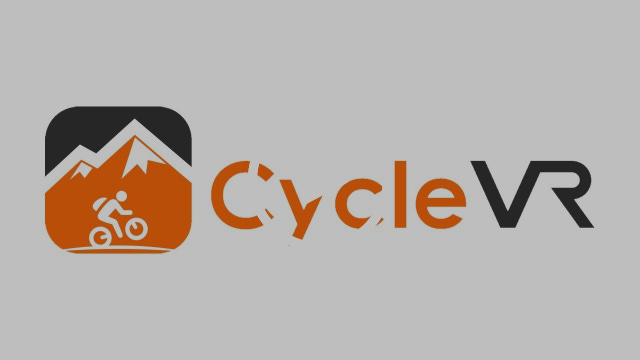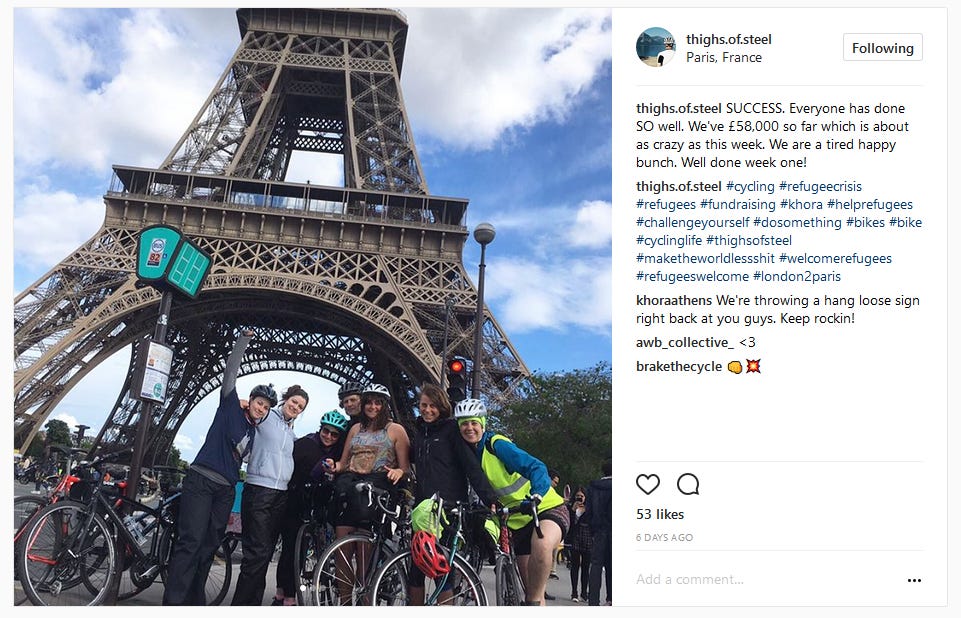Virtual Reality Rides & Master Builder Frames
ON THE ROAD
I write this from a precious seat on an otherwise seatless train. As a freelancer, I didn't realise that today's the Friday of a Bank Holiday weekend, and I'm heading for the coast.
There's three sisters from Newcastle on board with 6 large suitcases, taking up the entire vestibule area. I'm excited for them. They've got gin and tonic.
If boarding a packed train is making you feel agoraphobic, then why not travel without leaving your living room? In January Aaron Puzey finished an 8-month cycle from Land's End to John O'Groats. He rode just 50 minutes a day in his living room. In virtual reality.
He put himself on an exercise bike, strapped on a VR headset, plugged into Google Street View and pedalled.
I mean, VR will never (ever) (ever ever) beat doing the real thing, but, as someone who has cycled LEJOG twice (the long way round), I can easy go all listicle with my top ten positives nonetheless.
You won't get hit by a car and die.
You won't get hit by a car and paralysed.
In fact, you won't get hit by a car at all.
You can travel in micro-stages of minutes at a time, rather than in one fell swoop, or stages of a few days or weeks (which gets expensive in other travel costs).
You don't have to give up the day job, child care or even your daily appointment with Come Dine With Me.
You can maintain your personal relationships (without forcing people to cycle with you).
It's cheaper (probably).
You won't get sunburn.
You won't get lost.
But you'll still get fit.
Fair play to the lad. It'd be easy to scoff at such an epic achievement and reel off an even huger list of everything he missed out on, but that'd be stupid.

Aaron Puzey is currently running around the country trying to get his CycleVR setup into production. There'll be a Kickstarter soon, he promises. I'll keep you posted.
From white hot future tech to white hot, er, brazing...
Earlier this week, I wrote some bike descriptions for The Bike Project (if you ever wondered what my day job is, now you know) about a pair of bikes built by Ron Cooper. I never knew Ron while he was alive, but I'm glad I've come across him now.
Ron Cooper was a master bike frame builder who first set up business in a workshop near where I live in South London. I never used to understand why people would want a handmade frame when the machine-built ones are pretty much as good and a fraction of the price. Now I do.
There's the obvious argument from quality. A hand-built frame can be custom made to suit the rider and their riding style. After two days in the hands of a master like Ron, you apparently get a more stable, neutral, responsive finish to your frame.
But more significant, I think, is the evolutionary argument from knowledge. If we don't have master builders brazing frames, then what happens to that practical knowledge? It is lost.
As a species, we have probably lost more knowledge than we've retained over the millennia. That's not necessarily a bad thing - who needs to remember that sabre-toothed tigers stalk their prey in the early afternoon, or hate the smell of peppermint?
Storage and dissemination of knowledge is a decisive factor in the evolution or extinction of a species. At the very least, a species must somehow retain knowledge of how or where to find food.
In olden times this was done by word of mouth. Elders who survived the last famine 50 years ago were crucial to the survival of the family through the next. If for some reason those elders were wiped out, the knowledge (and probably tribe) was lost. This is currently happening.
Books and YouTube videos are a useful backup, but there's nothing like human experience, with all its adaptive ingenuity.
Human knowledge of hand-brazing bikes might one day come in handy for me personally. I'm imagining a post-apocalyptic (or just post-resource) world where all I have is a lump of steel and a brazing tool.
Okay, that's entirely ridiculous. I can't even unblock my bathtub plughole. But I do find it reassuring that at least someone out there is still hand brazing bicycle frames on my behalf. I don't want one, I can't afford one, but I'm glad they exist.
If I were to make a toast today, it would be to the master crafts(wo)men of this world. Our knowledge is literally in their hands.
IN THE MIND
I got a brilliant comment from WilForbis on my blog post about the science of psychedelics that poked me into re-examining the relationship between psychedelics and mental health.
It's always worth going back to the original research and in this case I appear to have unwittingly fostered a misunderstanding.
In my blog post, I wrote that:
“Using a data set of over 130,000 randomly selected US adults, including almost 20,000 psychedelic users, Pål-Ørjan Johansen and Teri Suzanne Krebs found no connection between lifetime psychedelic use and increased likelihood of mental health problems.”
Both WilForbis and I (and perhaps many other readers) assumed that "lifetime use" meant long-term use, but that is not the case. The authors use “lifetime use” to mean any lifetime use.
Specifically, their data analysis looked at mental health outcomes for people who have:
ever used any psychedelic
ever used LSD, psilocybin, mescaline or peyote individually
used LSD in the past year
In the following, p= is an indicator of the strength (or significance) of the correlation between the psychedelic use and the mental health outcome. The lower the p-value, the stronger the correlation. Generally speaking, p=0.05 is considered a sufficiently significant correlation and p=0.01 is a convincingly significant correlation.
Their analysis results were statistically significant in eleven areas.
People who had ever used any psychedelic were less likely to have been mental health inpatients in the past year (p=0.01). This is true across the board for any lifetime use of LSD, psilocybin, mescaline, peyote, and also past year use of LSD.
The remaining six significant results were that any psilocybin use is associated with lower likelihood of serious psychological distress in the past year (p=0.007), prescription of psychiatric medication (p=0.0004) and diagnosis of depression (p=0.002).
Mescaline/Peyote is associated with greater symptoms of a major depressive episode (p=0.02), but not associated with diagnosis of depression (p=0.59).
Finally, past year use of LSD is associated with reduced likelihood of serious psychological distress in the past year (p=0.04) and outpatient (p=0.01) mental health treatment in the past year.
Thank you to WilForbis for asking this question and making me go back to the original data – it is much more conclusive than I remembered!
The full reference is: Johansen, Pal-Ørjan, and Teri Suzanne Krebs. “Psychedelics Not Linked to Mental Health Problems or Suicidal Behavior: A Population Study.” Journal of Psychopharmacology 29, no. 3 (2015): 270–279.

Thanks for reading! Now what?
Now this phase of Foiled is over, I'm turning my eyes to the next and planning the second half of Cycling to Syria. There is much to be discussed and worked over, but I'm hoping to have more info next week.
In the meantime, enjoy the above photo from the mighty Thighs of Steel, who are somewhere in the middle of France on their seven week cycle to Athens.
May the wind be at your back! (Or at least may your train be not packed!)
- DC

I'm a writer and Jack of All Trades (if by "All Trades" you literally just mean writing).
This email is free, like all the stuff I publish on DavidCharles.info. But if you enjoy what you read and feel like making my day, why not buy one of my books or do something lovely. THANK YOU.


